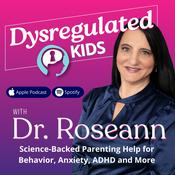Device Dysregulation™ can leave children overstimulated, anxious, and struggling to calm their brains after screen use. In this episode, Dr. Roseann Capanna-Hodge, expert in Regulation First Parenting™, explains how screens impact emotional regulation and shares strategies to help kids reset and thrive.
Parenting with constant screens can feel overwhelming. You’re not alone. Post-pandemic, many kids became overstimulated from online learning and social media, leaving parents unsure how to help.
Device dysregulation isn’t just screen time—it’s a brain stuck in high alert, craving dopamine, and losing tolerance for calm.
In this episode, you’ll learn why kids get stuck in device dysregulation, how to prevent emotional dysregulation, and concrete strategies for transitions, boundaries, and sensory resets that make real change possible.
Why does my child meltdown when I ask them to put the device down?
Meltdowns aren’t defiance—they’re the nervous system signaling overwhelm. Rapid-fire entertainment, dopamine spikes, and addictive social media can keep the brain in a constant high alert, often leading to emotion regulation difficultiesand maladaptive emotion regulation strategies.
These challenges affect children’s emotional responses, increase negative emotions, and in some cases can mimic symptoms seen in mental disorders or contribute to problematic internet use.
Tips for parents:
Co-regulate first: Model calm so your child can borrow your regulation and practice healthier emotion regulation strategies.
Avoid personalization: Their reactions aren’t about you—they’re dysregulated.
Predictable boundaries: Set device limits before the screen is on to reduce conflict and support consistent, regulated emotional responses.
Real-Life Example: Eli, a 12-year-old, became irritable and anxious post-pandemic. Consistent screen limits and calm parental cues helped him power down without daily battles.
How can I help my child regulate after excessive screen time?
Transitions from screens are tricky because the brain is overstimulated. Without grounding, kids and young adults can struggle with emotional awareness, executive functioning, and attention, increasing the risk of temper tantrums, negative emotional states, and experiencing negative emotions.
Practical strategies:
Sensory transitions: Jumping jacks, cold water, a sensory snack, or barefoot walks reset the nervous system.
Model coping: Show how you unplug and shift focus calmly.
Gradual transitions: Use timers and warnings for device cutoff to reduce experiencing negative emotions and prevent meltdowns.
If you’re tired of walking on eggshells or feeling like nothing works…
Get the FREE Regulation Rescue Kit and finally learn what to say and do in the heat of the moment.
Become a Dysregulation Insider VIP at



